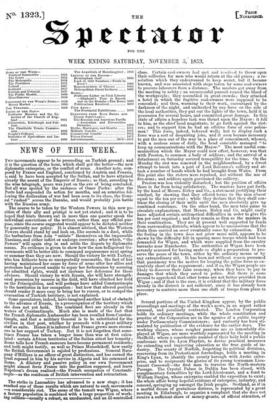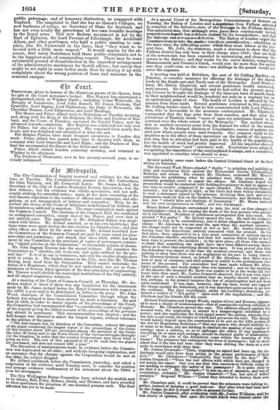Several portions of the United Kingdom appear, by the public
proceedings and meetings of the week's news, in an aspect rather unusual, and peculiarly contrasted. The London Corporation holds its ordinary meetings, while the whole constitution and practice of the Corporation are in the agonies of a public inquiry under Parliamentary Commissioners ; and curiosity has been sti- mulated by publication of the evidence for the earlier days. The working classes, whose rougher passions are so lamentably dis- played at Wigan, are more worthily represented by the meeting in Sheffield; where a considerable number of their body held a public conference with Dr. Lyon Playfair, to devise practical measures for extending and improving education as the true guide of in- dustry. The county of Norfolk, forgetting its political divisions, recovering from its Protectionist forebodings, holds a meeting in King's Lynn, to identify the county borough with Arctic enter- prise, and to reciprocate the glories of its young townsman Lieu- tenant Cresswell—the first man to traverse the North-western Passage. The Crystal Palace in Dublin has been closed, with complimentary formalities by the Lord-Lieutenant, and a feast to William Dugan, whose enterprise enabled the exposition to exist; the whole affair being hopeful evidence of enterprise, industry, and concord, springing up amongst the Irish people. Scotland, as if in a morbid dream of gratuitous distress, is represented by a great meeting in Edinburgh, to organize a complaint that she does not receive a sufficient share of money-grants, of official attention, of
..... .
pnblio patronage, and of honorary distinction, as compared with England. The complaint is, that she has no Queen's Colleges, no new harbours of refuge no Secretary of State for Scotland, and has not even locally the precedence of her own heraldic bearings
i
in the Royal al arms. This new Reform movement is led by the Earl of linton, the I.ord Provost of Edinburgh, Sir Archibald Alison an other gentlemen, who held a public meeting to com- plain like Mr. Fainwould in. the farce, that "they want to be treated with a little more respect." It would appear by the ab- sences, that many Scotchmen hold these public complaints not to be the happiest mode of commanding respect. There may be some substantial ground of dissatisfaction in the imperfect arrangement of the administrative machinery for Scotch affairs ; but surely that might be set right in some better mode than by mixing it up with complaints about the wrong position of lions and unicorns in the armorial ensigns.



























 Previous page
Previous page